AI Summary
Key Highlights of Top E-commerce Website Builders 2026
This post explores the best e-commerce website builders for 2025 and 2026, aiming to help businesses transform visitors into brand ambassadors by owning their online stores. The key insight: building a dedicated e-commerce website offers branding control, cost efficiency, and customer trust compared to marketplaces. It reviews top platforms like Shopify, Weebly, and Squarespace, highlighting features such as AI-powered tools, easy customization, SEO optimization, and multi-channel selling. Readers will learn to select the ideal builder to launch their store quickly, save time, and boost sales without coding expertise, positioning their brand for long-term growth.
“Transform Your Typical Web Visitors Into Your Brand Ambassadors” says E-commerce Website builders! 🙂
The global e-commerce market continues to grow rapidly. Worldwide online retail sales reached about $6 trillion in 2023 and are expected to surpass $7.3 trillion by 2026 as more customers shop online across devices and platforms. Ecommerce now represents a significant portion of global retail activity and remains one of the most accessible ways for businesses to reach customers directly.
At the same time, the tools used to build online stores are evolving fast. Traditional drag-and-drop builders remain popular, but artificial intelligence and automation are reshaping how e-commerce sites are created and managed. Today’s builders can generate layouts, write product descriptions, optimize SEO, and even suggest marketing content with AI support, dramatically reducing setup time while improving performance and conversions.
According to market forecasts, the global e-commerce website builders market is on track to nearly double in value by 2035, driven by small businesses moving online and increasing demand for easy yet powerful tools.
This blog explores the top e-commerce website builders in 2025 and 2026, comparing their features, strengths, and ideal use cases so you can confidently choose the best platform for your business goals.
1. E-commerce Website is the Winner of Online Selling
Do you know? BigCommerce’s History of E-commerce has reported “Customers will soon expect to be able to “research, browse, shop, and purchase seamlessly between different devices and on different platforms – like a standalone web store, an Amazon presence, etc”.
Did you know?
According to reports, 76% of consumers research a business online before visiting in-store. Selling your products online means, you have two options – ‘Selling on an online marketplace’ like Amazon, Etsy, eBay, and Walmart or ‘Creating your own e-commerce website’.
Also Read
Being the King of Your Own E-commerce Website
- As you build concrete branding through your e-commerce website, you’ll earn the trust and confidence of your target buyers.
- It’s a cost-effective & one-time investment solution, you’re only going to pay for the website development.
- There are multiple options to establish a bonding with existing buyers and prospects.
- You can sell, market, and promote your brand and products as you like. You can set your own terms & conditions.
Being at the Mercy of Online Marketplaces
- Prospects will experience only the branding of the particular e-commerce platforms through which you sell your products.
- You’ve to pay certain charges to the e-commerce owners for advertising and selling your products on their sites.
- You’re not supposed to reach out to your customers and build a following for your brand
- You’ve to rely on the platform’s policies, restrictions, terms & conditions. You cannot build a unique identity, instead, stand behind the shadow of the platform.
So, it’s not like selling via e-commerce sites is something evitable. Ofcourse, these popular online marketplaces like Amazon, Walmart, and others are the best option, if you want to reach a massive audience since they have a huge customer following.
However, selling online is now becoming ‘SMART’. Hence, if you want to be the ‘Owner of Your Online Store’ without relying on third-party sites, then ‘Developing Your Own Website’ is the smartest decision.
The blog Top Payment Gateways in Europe helps businesses choose the right payment partner.
2. Best E-commerce Website Builders in 2026
There are different methods to turn your website into a full-fledged online storefront.
- Create a dedicated e-commerce website from scratch
- Add an e-commerce plugin to your website
- Use an e-commerce website builder
As says the title, in this blog, we’ll dig deeper into creating a website using e-commerce builders.
Did you know?
There are more than 24M+ e-commerce websites active on the world wide web right now, and that number is growing every single day.
Creating a website may seem overwhelming to you, but with the help of ‘website builders’ you can nail it down perfectly. Website builders take care of the technical jargon.
Right from domain purchasing, hosting plans, theme customization, and testing, to publishing, you get everything in one place. This makes website development as simple & fun as preparing your favorite meal!
Mountain of Perks from E-commerce Website Builders: This is Why, Users Prefer Website Builders for Online Storefront Development
- Dozens of ready-to-use templates for designing product catalogs, shipping, inventory management, sales reports, order tracking, payment, checkout and the entire website
- User-friendly drag-and-drop and interfaces allow even an average person, without any extensive coding expertise to type in text, upload product photos, change & move any element using simple mouse clicks without having to write or edit a line of code
- Variety of customization options
- Easy-to-use and quick website setup and installation
- Plethora of themes, design elements, functionalities, etc.
- Library of stock images and graphics
- Compatibility with social media platforms
- Multi-channel-selling via online, in-store, marketplaces like Amazon, eBay, etc.
- Optimization of the store for web search – Google, Yahoo, and Bing
- Saves more time and money
- Inventory management feature
- User tracking and analytics
- Customer support and hassle-free maintenance
- And many more
Below, we’ve hand-picked a few website builders for you to choose the right one that well-suits your requirements and help you launch your online store without putting in much time and effort.
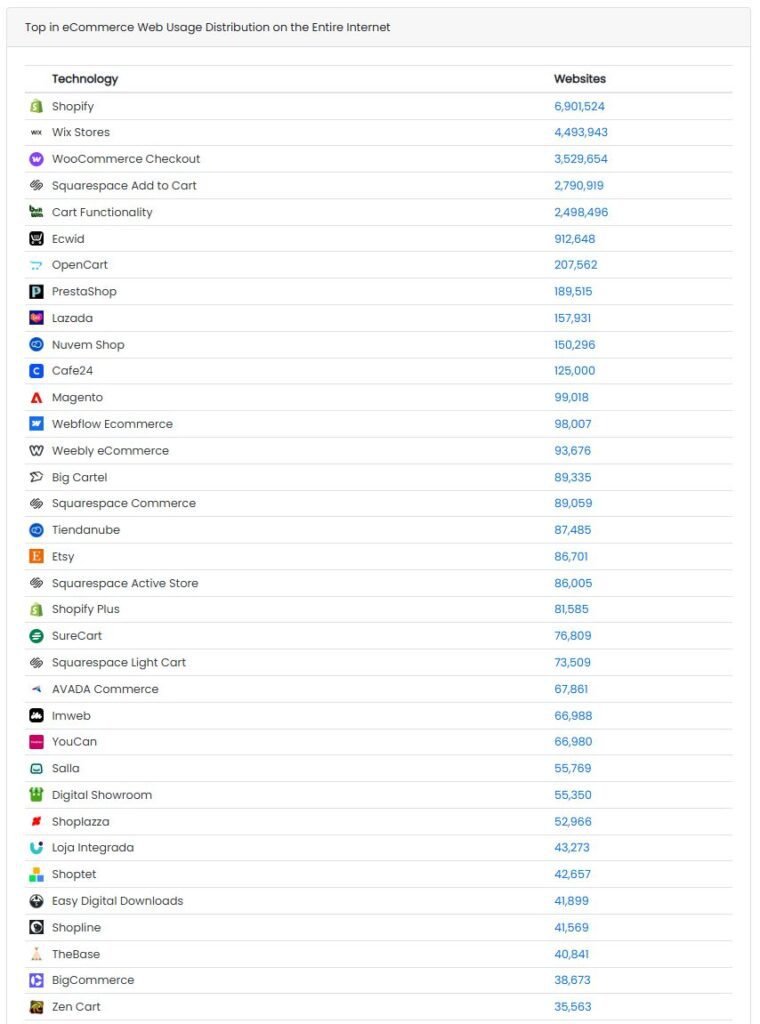
Image credits : trends.builtwith.com
Based on our experience with clients and knowledge of website builders, we did complete research about the features, compatibility, pricing, and customer support, and only then prepared this list.
1. Shopify
Best for – Large businesses

Using Shopify, businesses in over 175+ countries worldwide have made over $200 billion USD in sales. The platform holds on a solid mission of helping businesses of all sizes, whether beginner or established, to grab ownership. Start, sell, market, manage, and grow your e-commerce with the pack of e-commerce tools and features of Shopify. For those weighing their options, our Shopify vs Shopify Plus: A Feature Breakdown for Merchants can help you make an informed decision. And moreover, we can assist you in Shopify development as well.
Pros
- Supports in branding – business name, logo, domain name
- Lots of stock images, theme templates available in the library
- Provides opportunities for dropshipping business through Oberlo
- Mobile-responsive
- Provides SSL certificate
- Provides customization options
- Integrates with payment gateways
- Multi-lingual support
- Ability to learn and categorize your customers based on behavior, purchase history, etc.
- Allows to optimize your store for search engines
- Sitemaps are automatically generated
- Compatibility with social media accounts
- Offers smart inventory management system
- Easy to organize your products and sell unlimited with products’ photos from multiple photo angles
- Unlimited bandwidth
- Track your online store using Google Analytics & Google Merchant Center reports
- Provides 24/7 customer support
- Supports omnichannel selling – in-store, online, and more
- Easy to track the performance of staff
- Offers hassle-free checkout experience
Cons
- Very expensive
- Levies charges for transactions
- High dependency on third-party apps
- Offers only basic blogging features
Pricing
- 3-day free trial and $1/month offer
- Basic – $39/month
- Shopify – $109/month
- Advanced – $399/month
- To learn more about pricing details, click here
2. Weebly
Best for – Small businesses
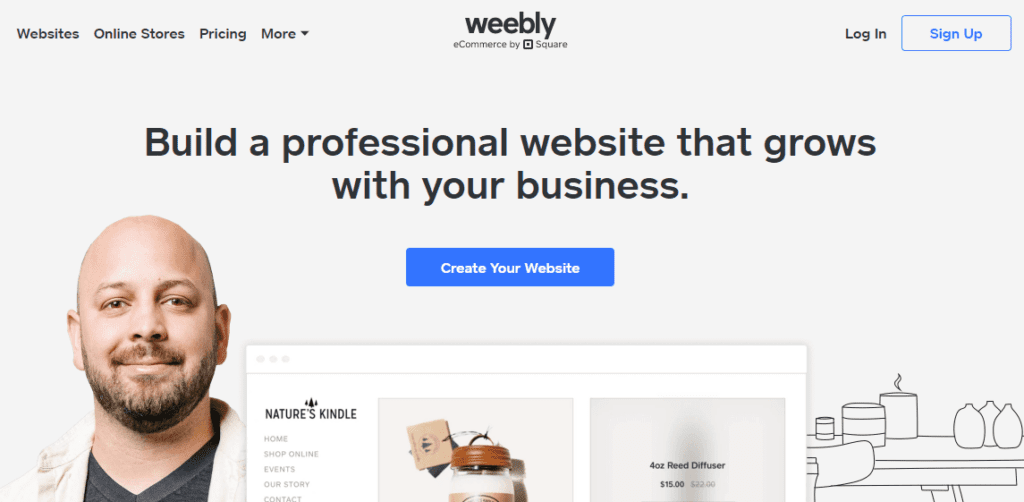
Launched in 2007, Weebly now powers more than 50 million sites worldwide. It’s situated in regions like New York, Scottsdale, and Toronto. Through it, you’ll be able to turn your brick-and-mortar store into a professional e-commerce business. The experts at Weebly guide you on handling the hassles while running an online store.
Pros
- App Center provides millions of third-party integrations
- Mobile-friendly and customizable theme templates
- Offers a full-suite of tools for SEO purposes
- Allows to customize your domain name
- Enhance your site performance with free, dedicated hosting services
- Allows to publish blog content
- Allows to create custom contact forms, RSVP lists, and surveys
- Provides options for embedding videos from other platforms
- Easy to track web visitors
Cons
- Very few features only available
- Lots of limitations in the blogging & multi-lingual tools
- Charges additional fees for tech support
Pricing
- Personal – $10/month
- Pro – $12/month
- Performance – $26/month
Click here to know more about the pricing details
Also Read
3. Squarespace
Best for – Creative professionals

Squarespace was founded in 2003 at the University of Maryland. The team has grown now with 1640 members and such that millions of websites have been launched using this platform. With Squarespace, you’ll be able to bring your website idea into reality. Create, sell, and market your online store without any experience in coding and design.
Pros
- Provides customizable & mobile-friendly design and layout templates
- Text, photos, videos, audios, and any content type can be added
- Provides customizable color palette, font styles, banner designs, and more
- Password protection is available to lock several pages
- Has in-built search feature
- Mobile app version available
- Allows to write, publish, and optimize blog posts, podcasts, portfolios,
- Categorize your physical goods, digital products, and services
- Product zoom feature available
- Easy-to-use interface supports in inventories management
- Ability to track and analyze customer behaviors
- Compatibility with social media accounts
- Accept donations through Donations Block section
- Supports multiple payment gateways
- Integrates with commerce-based APIs
- SSL enabled and compliant with PCI
- Supports in branding – logo design, domain registration
- Integrates with Google Workspace
- Has built-in SEO tools
- Provides 24/7 email support, live chat, community, expert guidance as well
Cons
- No free plan
- Multi-channel selling is not available
- Lack of marketing tools, third-party extensions
- Not a good option for blogging
Pricing
- Basic – $16/month
- Core – $33/month
- Plus – $39/month
- Advanced – $99/month
- To learn about pricing, click here
4. BigCommerce
Best for – Savvy entrepreneurs
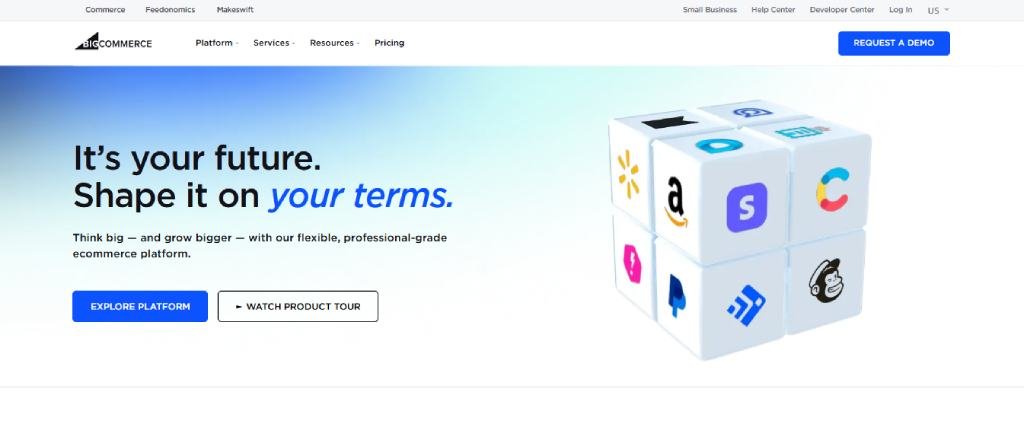
As a leading Open SaaS solution, BigCommerce empowers small startups, and mid-market businesses, to large enterprises to build, innovate and grow their businesses online. It was introduced in the year 2009. Started with just 2 people, and now they’ve 60K+ users and 10K+ full-time employees to a global team.
Pros
- Easy to sell via multi-storefront, marketplaces, social media, and in-store
- Allows to customize themes, widgets, coding scripts, social links, etc
- SSL enabled and PCI compliant
- Launch and edit pages with drag-and-drop solution
- Mobile responsive themes
- Integrates with WordPress
- Customize the checkout process
- Optimize site speed with Google Cloud Platform, AMP, and Akamai Image Manager
- Supports third-party APIs
- Compatibility with digital wallets
- SEO optimization
- Provides different e-commerce solutions including headless, B2B, and others
- Analyzes and tracks customers’ records
- Provides 24/7 customer support
Cons
- It’s not a beginner-friendly platform
- Highly expensive theme options
- Pricing plans are limited annually. No monthly packages
Pricing
To get a custom pricing plan, you can just fill in the details and submit form
5. Wix
Best for – Individual small to medium sellers
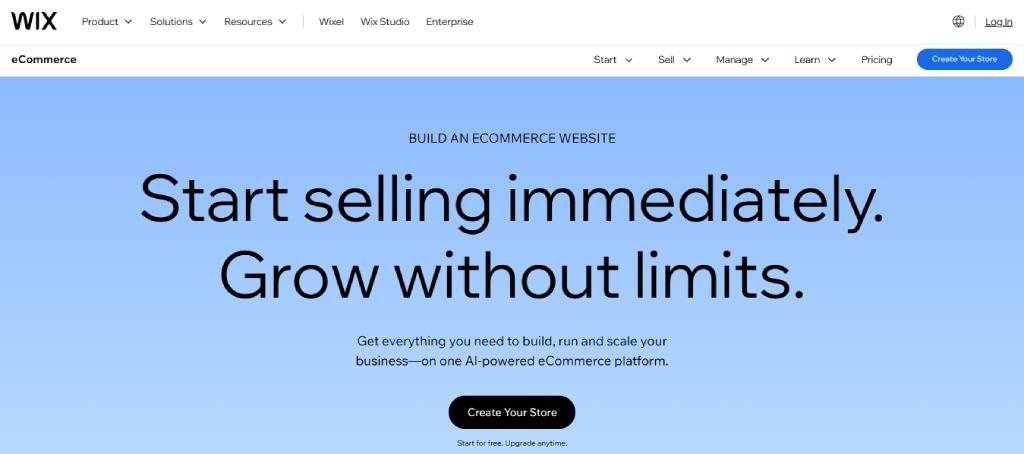
Since its launch in 2006, Wix has shown a gradual enhancement, now it holds more than 200M+ users around the world. Regardless of who you are, perhaps, an entrepreneur, designer, developer, musician, photographer, or restaurant owner, you’ll be able to establish your presence on the web. Get access to hundreds of tools and features in this drag-and-drop website builder to develop your online store.
Pros
- Provides stunning and animating design features and templates
- Offers advanced SEO tools
- Mobile-responsive layout
- Customizable color palette and theme templates
- Compatible third-party apps and extensions
- Manage your databases efficiently
- Easy to customize domain names
- Provides free web hosting services
- Track site’s performance and status
- SSL-enabled
- Integrates with social media accounts
- Supports multiple payment gateways
- Sync with Google Calendar
- Provides 24/7 booking feature
- Mobile app version available
- Automatic email reminders
- Easy to create, edit, and share blog posts
- Allows to create and showcase music albums, tracks, and playlists using fully-customizable music player
- Design and secure your photos and images with watermarks and password
- Allows to create, publish, and promote branded video content
- Optimize your content for SEO
Cons
- Not for beginners
- Poor customer support
- Expensive third-party extensions
- Not a multi-channel-friendly platform
- Back-end order management tools are not effective
- Limited storage
- No built-in POS system
- To give a new look to your website, you cannot change the theme directly, you’ve to again rebuild your site completely
Pricing
- Lite : $17/month (2GB storage)
- Core: $29/mo (Basic selling, 50GB storage)
- Business: $39/mo (Standard selling, 100GB storage, advanced analytics)
- Business Elite: $159/mo (Unlimited storage, priority support, loyalty programs)
- Click here to know more about the pricing details
6. GoDaddy
Best for – Beginners
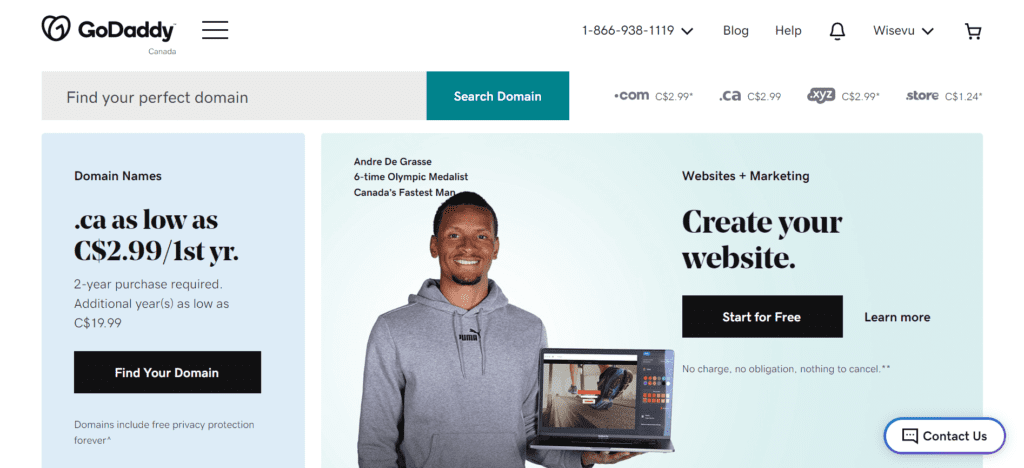
GoDaddy, a powerful e-commerce platform to leave a sleek e-commerce website experience to online buyers. More than 9K+ employees are operating from regions like Seattle, Sydney, Carlsbad, and Cologne. Trusted by over 20M+ users in the world. It’s possible to add more than 5,000+ digital & physical products with up to 10 images per product and manage them all easily.
Pros
- Supports PayPal and Apple Pay
- Automatically optimizes your website for Google, Yahoo, and Bing
- Provides millions of design templates
- Allows to host successful email campaigns
- Mobile-friendly checkout process, shopping cart, and designs
- GMB and Facebook business page optimization
Cons
- Limited features
- No mobile app version available
Pricing
- Free version is available
- E-commerce – $20.99/month (first year only)
- To learn more about pricing, click here
7. WooCommerce
Best for – Business owners with web experience
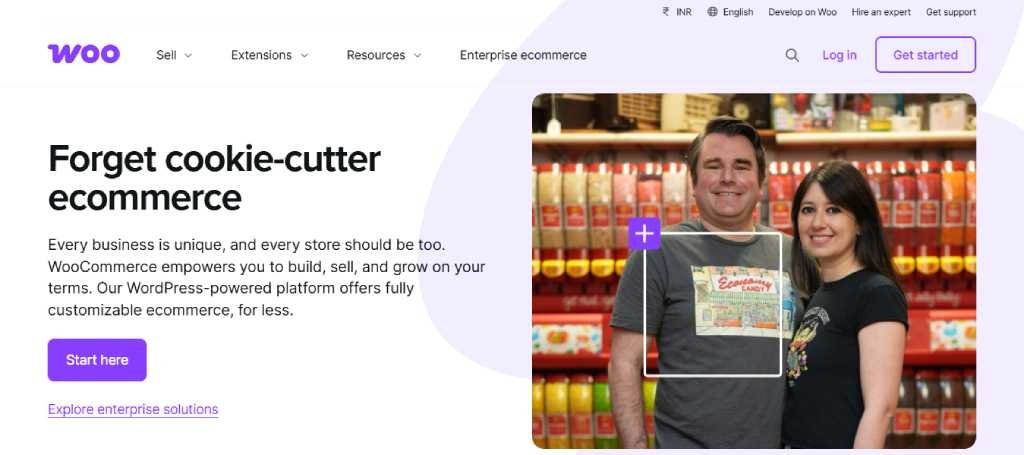
WooCommerce was launched in 2011 as a flexible, open-source commerce solution built on WordPress. It enables small, medium, and any-sized businesses to transform their static WordPress website into an e-commerce storefront. Today, this platform has offices in 32 countries including Norway, the United Kingdom, and South Africa operated by over 150+ team members. If you need any assistance in WooCommerce, you can checkout to our WooCommerce development page.
Consider referring to WooCommerce vs Shopify statistics for a more in-depth comparison of these two popular eCommerce website builders.
Pros
- Easy to design homepage, menus, site structure, payment, and shipping pages
- Accept payments using credit cards, bank transfers, cheques, cash, and via payment gateways as well
- Easy to add products through the user-friendly interface
- Possible to sell both physical and digital products
- Compatible with hundreds of third-party extensions
- Accepts multi-lingual content and multiple currencies
- Secure your site with Jetpack
- Allows to list your products on Google Shopping
- Easy to promote your store on Facebook and through emails
- Integrates with Google Analytics
- Offers a dedicated support team
Cons
- Ofcourse, the platform can be accessed without any coding expertise, though, requires tech learning about navigating through the platform
- More usage of plugins
- Website speed gets impacted heavily with optimized hosting providers
Pricing
Free. However, if you need to add extra functionalities, then you can choose between the list of paid plugins & third-party extensions.
8. Magento/Adobe Commerce
Best for – Entrepreneurs with web experience
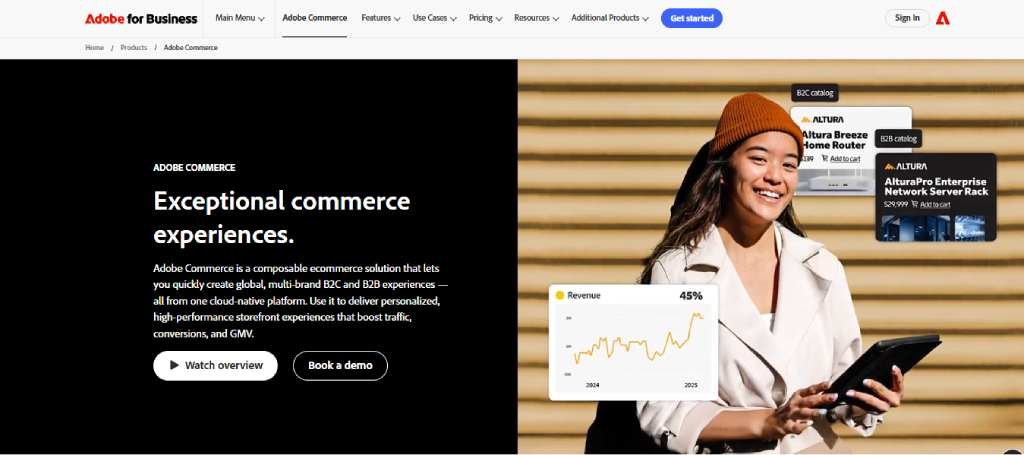
Magento, is now, Adobe Commerce, an e-commerce platform introduced by Adobe that offers B2B & B2C shopping experiences. From catalog to payment and shipping, this platform helps you build a professional shopfront with advanced features. Launch, manage and scale your e-commerce business with tools facilitating cloud deployment, Analytics, and many more.
Pros
- Create compelling content using drag-and-drop page builders
- Supports AI-driven product recommendations
- Built-in POS system facilitating multi-channel-selling and dropshipping
- Provides analytics reports
- Customize your store with third-party extensions and themes
- Mobile-friendly experience
- Supports headless & API-based commerce
- Integrates with Amazon marketplace
- Provides real-time inventory management and customer management opportunities
- Allows to build Progressive Web Apps (PWA)
- Collaborates with ShopRunner and FedEx services
- Provides analytics and visual reporting
- Includes a cloud-based data warehouse
- PCI compliant
- Integrates with ERP system
- Integrates with payment solutions
Cons
- No free version is available
- No marketing tools
Pricing
To learn the pricing details, do take a demo and request custom pricing plan
9. Zyro
Best for – Beginners
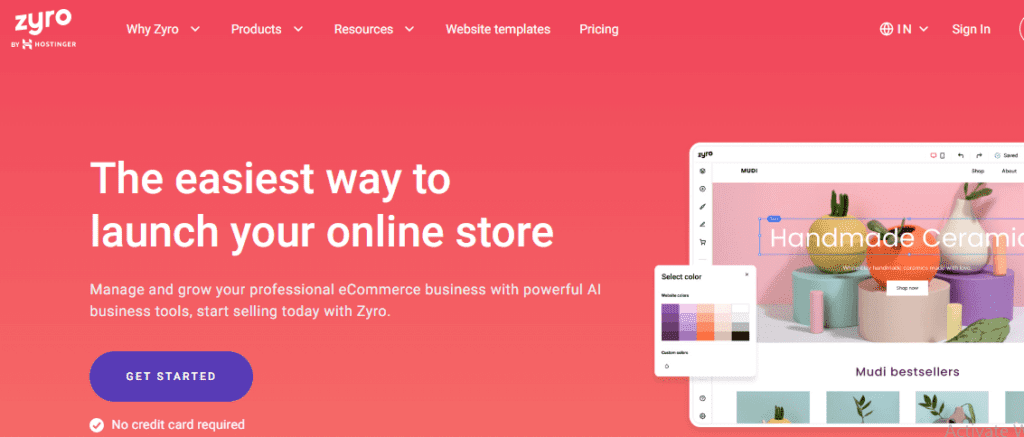
Zyro, an e-commerce platform built exclusively for small business owners to thrive in their business. It’s headquartered in Lithuania and holds offices in Finland, UK, Germany, and Switzerland. More than 250K+ small business owners worldwide are collaborating with Zyro. It provides 100+ design templates to build your online store even from scratch.
Pros
- Allows to sell via online, in-person, Facebook, Instagram, and Amazon
- Mobile-friendly design and layout
- Easy to track and manage inventory using the intuitive dashboard
- Accepts payments via PayPal, Visa, Stripe, Mastercard, and more
- Track order history, payment, shipping status and update the details to buyers via emails
- Supports AI marketing integrations
- Possible to post custom ads on Facebook and Google Shopping
Cons
- Not many addons or features
- Limited customization options
- Switching to other templates in the middle of the design is not possible
Pricing
- Free version is available
- Business – $4.90/month
- Online Store – $8.90/month
- Advanced Store – $15.90/month
Click here to learn more about the pricing details
10. Shift4Shop
Best for – Enterprise-level business owners

Shift4Shop e-commerce platform is built to address the business challenges inherent in successfully reaching visitors, engaging shoppers, converting sales, and nurturing customers online. With this software, you can develop a winning e-commerce workflow and optimize your e-commerce store like a pro.
Pros
- Customize themes with colors, font size, adhering to your brand tone
- Add unlimited products
- Categorize your products by filter options
- Optimize your online store for web search
- Import and export from and to CSV files
Cons
- Not beginner-friendly
- Has multiple built-in features which might confuse the users
- Themes seem hard to edit and customize
- Pricing is limited annually
Pricing
- Free version is available
- Basic Store – $29/month
- Enterprise – custom
To learn more about the pricing details, checkout this page
11. Webflow
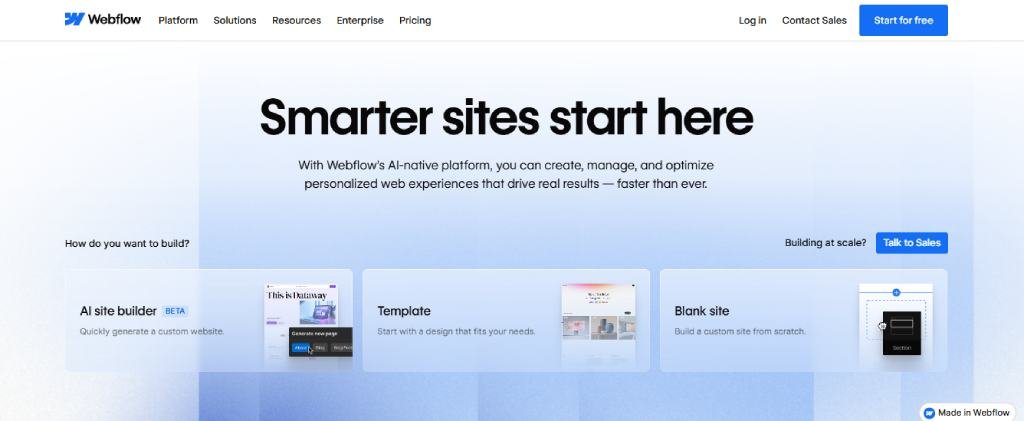
Best suited for Designers and advanced users who want full visual control. Webflow stands out because it blends visual design freedom with ecommerce capabilities. It is less beginner-oriented than Shopify or Wix, but excellent for stores that need custom layouts, animations, and advanced CMS features.
Pros
- Full visual design control without code
- Advanced interactions and custom layouts
- CMS + ecommerce combined
- Strong SEO and content tools
Cons
- Steeper learning curve than drag-and-drop builders
- Higher price at ecommerce tier vs basic sites
Pricing
Standard: $29/mo (billed annually) – Best for new, unique boutique stores.
Plus: $74/mo (billed annually) – Best for scaling brands (includes 0% Webflow transaction fees).
Advanced: $212/mo (billed annually) – For large stores with up to 15,000 products
To learn more about the pricing details, checkout this page
3. Pick the Right E-commerce Website Builder for YOU!
How to Build Your Online Store Using E-commerce Website Builders?
- Choose a website builder that suits your needs, either open-source or SaaS or headless commerce
- Sign up for a subscription plan of the builder based on your site’s requirements
- Pick a unique domain name while you sign-up the builder
- Select a theme for your website from the thousands of design templates
- Customize your theme template by adding new products, changing the size, color, and style of the fonts, editing the homepage images, and more adhering to your branding
- It’s time to add your products’ images, videos, text, and other forms of optimized content onto your website
- Install extensions from the library if you need to integrate functionalities
- Before pushing your site to live, ensure it has undergone proper site testing (Click on the preview button in the editor to visualize how your site will look like)
- And, finally. You’re there to hit on the Publish button to show your site for the world to see
Looking for eCommerce Development Services?
Seize and experience the transformative impact of eCommerce Development Services & Solutions with ColorWhistle.
Factors to Consider Before You Invest in a Website Builder
- Ease of use & accessibility
- Set of features
- A variety of customization options
- Compatibility with third-party extensions
- Optimized for mobile
- Ability to add content
- Limitations
- Payment options – Redirects, on-site, & off-site
- Shipping & tracking feature
- Analytics & tracking
- Customer support
Hopefully, now you’ve got an idea on how to build your online storefront using e-commerce website builders. If it seems overwhelming to you, no worries, you can take assistance from professional e-commerce website development agencies like ColorWhistle.
Feel free to reach our team via message or call +91 (944).278.9110 or +1 (919).234.5140 at any time. We’re ready to assist you!
In quest of the Perfect eCommerce Development Services & Solutions Buddy?
Be unrestricted to click the other trendy writes under this title that suits your needs the best!
- Best Jewelry Website Design Ideas and Inspiration
- The Ultimate Guide for Ecommerce Fraud Protection
- 3D Product Configurators & Augmented Reality: Elevating Your Furniture Brand Online and Offline
- Creating a Jewelry Website – Here are 15+ Factors to Consider for eCommerce Jewelry Website
- Top Business Models that Works for Online eCommerce Websites
- Insights on Global e-Commerce Trends from a Digital Agency Perspective
- Top Beauty & Lifestyle E-commerce Websites – A Tech Audit
What’s Next?
Now that you’ve had the chance to explore our blog, it’s time to take the next step and see what opportunities await!

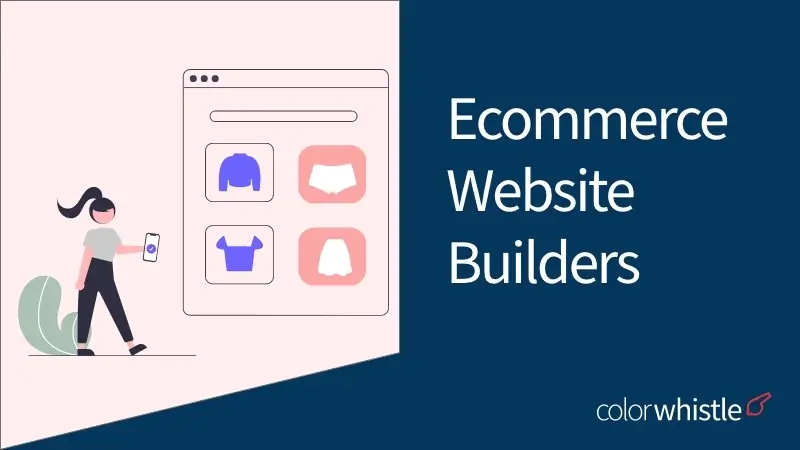

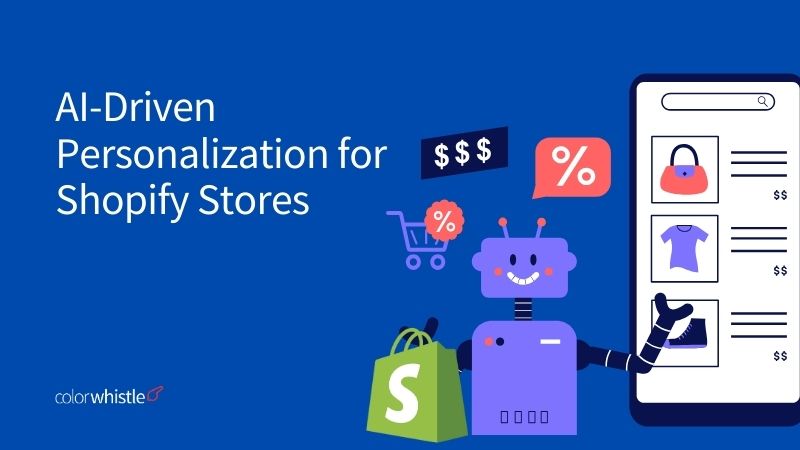


“Your blog perfectly captures the essence of modern e – commerce web development. The examples you provided make it even better!”
Thanks for sharing valuable insights. Looking forward to more enriching content from your platform.
Yes, Finding Good Quality Content.
Thanks for the post, nice information about the e-commerce website builder’s guide. We have been developing websites and software for a long time, which is really helpful. I recommend it to others.